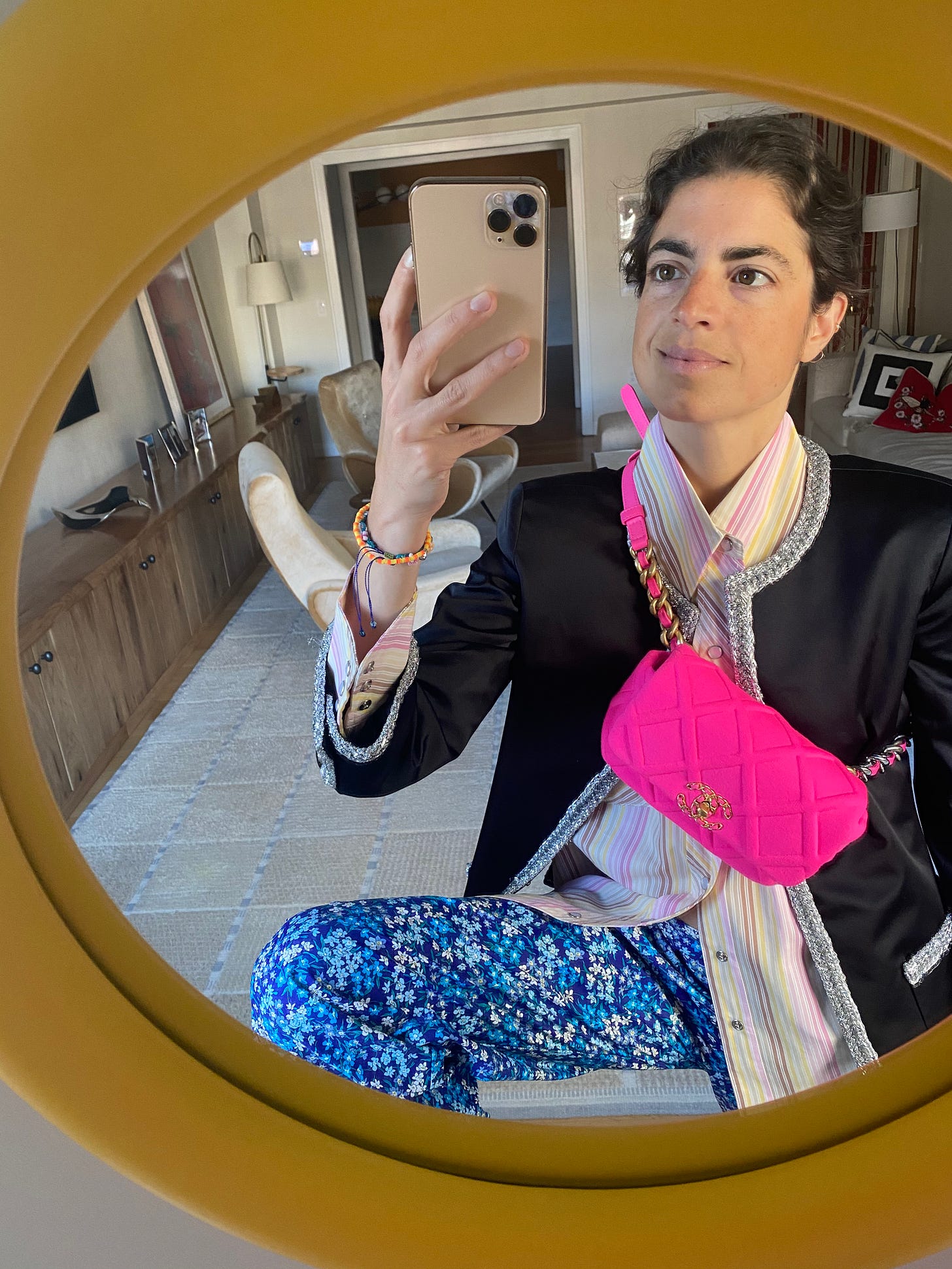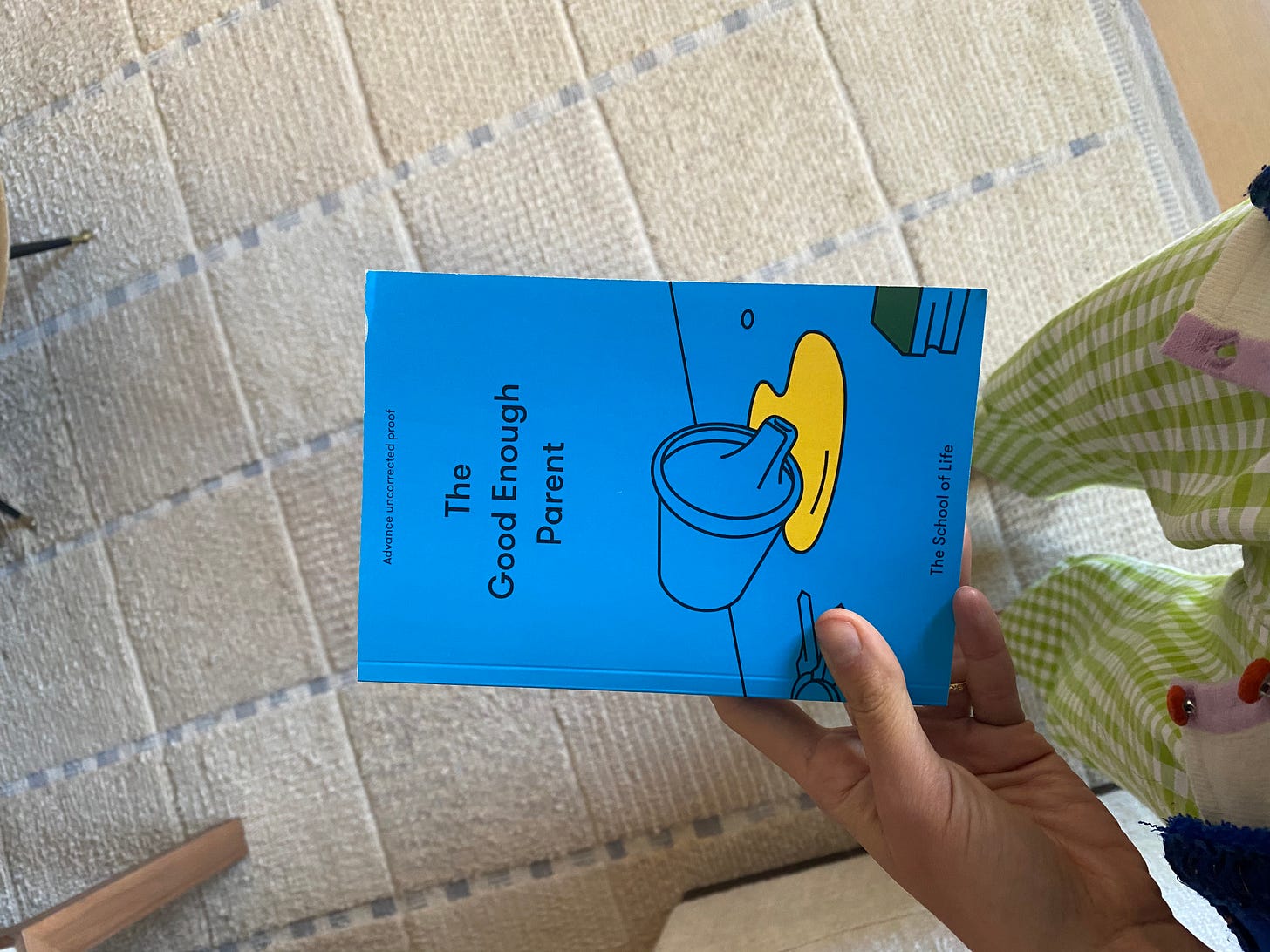Welcome to Dispatch #052821, another series of thoughts written over the course of the last ten days. If you have arrived here by accident but want to stay, you can subscribe with this button:
5/18: Dear fucking life
Do you ever get the feeling when you’re scrolling through your phone and your heart is racing and your head literally feels like it is a raisin that you have finally, actually, reached your limit. You’re done! So you put it down and look around and I mean, really look around.
You see those kids laughing with each other as they cross the street wearing backpacks that are double their size. And that woman over there is sharing her lunch on a park bench with, I don’t know, maybe a stranger? Maybe her lover? What does it matter.
When you turn around, you see some other person helping this guy who is lugging grocery bags from the opposite direction and you look up and there is a tree right above you and for the first time you notice how utterly lovely it is when Spring comes around and from those branches of wood — the hollow, dense wood — new life emerges.
Flowers literally bloom.
They’re tiny and pink and as you watch them budding from within the frail branches, you wonder how it happens that from one day to the next, a naked tree is enveloped by little pink buds.
You look at them from a distance and it’s almost like they’re wrapped around the tree, hugging them for dear life because that is exactly what this is: dear. Fucking. Life.
Awesome and awful and cheerful and painful and tragic and gorgeous and ugly and graceful and cruel and so kind and poised and offensive and sweet and funny and nasty and real. It is so real.
How does one capture the paradoxes of that realness?
5/21: Melting chrysalis
New York seems really to be ready to return to itself. Or turn into a new self, perhaps. But I think I have been living in lockdown mindset. Or at least I was living with the awareness that there is a lockdown mindset at all. That in New York, the mindset is outdating in real-time.
I’ve never actually used that term before but it seems to be what it is — lockdown mindset. When you’ve become so accustomed to the behaviors you developed in the pandemic that they’re now automatic. They’ve integrated so unconsciously with my former habits, I’m not even sure the former habits exist anymore. They’re like a different thing altogether. I’m different altogether. But I feel…the same?
This fact makes it harder to pinpoint exactly what is outdating. Or maybe that there is any outdating in progress at all. It’s like I can sense the force of forthcoming change. It moves in like an unexpected storm even though I tell myself I was expecting it.
Some of the parts are easy to rip out but others rub up against me uncomfortably.
There’s this gap between what I feel (something is changing! What is it?) and what I know (routine, whatever is not the forthcoming change but seems fragile enough to break) and that makes me want to push it away.
Until I’m like, wait, what am I pushing away? I don’t ask this rhetorically, I’m genuinely wondering.
Is it the lockdown habits? But what am I supposed to do with them now? I don’t want to retain a way of being that’s tailored for a pandemic.
Is it the ones carrying over from the life before it?
Some combination of them both?
I ask the questions and start to answer and suddenly, change isn’t a zombie insect life ruiner emerging from the depths of the sharp but subtle storm, it’s more like a melting chrysalis on the branch of a tree that’s enveloped by buds soaking in the rainwater as the sun breaks through a cloud.
5/25: The case of the high five
I think I’m getting better at divorcing sensations like discomfort (i.e. the ones we typically marry to negative connotations) from judgments like good or bad. Doing it is kind of sucks at first — like, there is never the immediate payoff that comes when you decide you hate or love something.
You don’t write anything off or further latch on to it and that means you kind of just stand there. Watching the sensation dance through you, kind of annoyed at it for not being as intrusive (or as satisfying) as you thought it was going to be. Disappointed that it can’t confirm that the thing you have thought about the way that you were is the thing to keep thinking about the way you are growing.
I got so fucking annoyed this morning, Madeline woke up at like 6 a.m., and started to cry whine “I want a high five from mommy,” for, I’m not kidding, 45 minutes until I went in there, anger-a-blazing, and yelled, “It’s not time to wake up yet!”
Then I shut the door.
The whining got louder, of course. And I didn’t feel any better. I was more pissed in fact that I hadn’t accomplished what I went in there to do: calm (and quiet) her down. Did I even realize that’s what I intended to do? If I had, would I have gone about getting my desired outcome the same way? I think I’d become so consumed by my own fury that there was nothing above, below, outside or around it.
When I went back to my room, I thought to myself, how could I have handled that differently? Like, if I had actually given her the high five that she wanted, annoying as it was that she was asking for the fucking clap together of two different hands that occupy different bedrooms at 6 in the morning, would she have stopped whining? I went back in and said sorry that I yelled, gave her the high five, and for the next 20 minutes, it was silent.
I don’t know if that was “the right thing to do” but instantly, I felt less immature. More like a pushover but less immature.
Isn’t that tension odd?
I used to call the process of being a parent “swallowing my ego,” but when my friend Nick heard me say it one time while I was probably talking about some other instance that caught me in the threshold of that tension, he was like, “Don’t you mean surrendering?”
It was one of those semantic bombs that actually reorient a small part of your purview (though obviously not without the occasional lapse). That make you start to think about how you’ve defined a word like “pushover,” what it represents in your own constellation. How you see or don’t see yourself as one. What it means, really, and how it gets in the way of your finally getting out of your own way.
Last week I was on the reservoir in Central Park at 90th Street and overheard a conversation between two power walkers behind me. One said to the other, within the context of what sounded like a venting session on the part of the former, “Sure, I can act like a grown-up and not make this a big thing, but I’m sorry, no, I can’t.” I think she was talking about a relative in-law, I’m not actually sure but I wondered if she was doing the same thing I had done this morning. Forgoing her own compass of maturity to make herself heard? Give that fury a place to fester outside of herself, unload it then let it take hold?
But there’s a difference, you know, between resignation — being a pushover — and resigning yourself to maturity. This in fact might be the difference.
I’m not really sure though, are you?
5/27: It’s not about you
The reason it’s helpful to separate sensations like rage from situational circumstances like your kid crying for a high five or your in-law doing something that bothers you or like, the upload of some other person’s social media post, is because it disarms the electric passion that overcomes us when we think it’s always about us. Judgmentalism has a way of making everything so personal.
We judge each other to assert ourselves. You like this, you don’t like that. It’s right. It’s wrong. It’s fair. It’s not. All of it says something about who we are. At its most benevolent, it’s an unproductive form of self-expression. Most mercilessly, it’s a way to rank ourselves above or below each other.
In the example of getting mad about Madeline’s crying for a high five, here’s the thing: if I think my daughter is crying for the express reason that she wants to piss me off, I’m justified in my rage, right? Like, she is doing something to deliberately get on my nerves and thus I feel wronged. I am wronged! So I have this desire to defend myself because, and the audiotape of my mind starts to play, “I’m not a doormat! No.”
This isn’t a perfect metaphor because she is my child, and even if she was incentivized to piss me off, I’m too invested in helping her become a well-adjusted person in the world so it’s nearly second nature for me to say that while she’s too young to have such incentives, even if they are to develop over time, they will have been the resulting learned behavior of some other way our wires crossed — of her not getting something else she needed: attention, validation, IDK, it’s all still theoretical.
Maybe, actually, this is the perfect metaphor because the whole point of this exercise for me is to learn to live more compassionately. I want to do it without implicating myself by throwing my naked body onto a hot stove in the name of forgone judgmentalism (see: the bad kind of pushover), but also don’t want to be a fuckhead.
Anyway, the point is that when I consider the reality that the crying is actually completely about her and her own feelings, that she’s not trying to do anything to me, just like, get something for herself (probably not even actually a high five) even if it is from me (this is where I can ask: Can I give it to her? Often the answer is yes bc, duh, I’m her mom, but often also, it will be no) — it diffuses the rage. Or at least puts the responsibility of dealing with it completely back on me.
And why the hell would I give it to her anyway? I mean I know why I would give it to anyone, it’s so much easier to lay it out and be like, “Here, you deal with this.”
But also, it’s mostly not a productive way to live if you’re after meaningful relationships born of intimacy and interdependence and also, if you’re after responding to reality as opposed to your interpretation of it.
Ka-ching!
More and more, I’m finding myself drawing this distinction. Reality vs. my interpretation of it. Seeing the differences then starting to be them is like nestling into a more advanced pocket of agency.
It’s just that when you’ve conditioned yourself to believe that it’s always about you, and then you start to learn that actually, it’s not at all about you, it is first very humbling and also kind of sad — like you feel bad for yourself — because suddenly, the world is so big and no one gives a shit about your place in it and those buds are blooming on the tree whether you’re watching them or not.
Then, if you can stop feeling so bad for yourself, the depression melts off and you get kind of angry — like, “Wait! I care! I care a lot. This is my life!” and then it gets scary because you’re like, “Oh shit. This is my life.” So you spiral and spiral and then throw spaghetti and a ton of it falls, some of it sticks, then that falls too and you keep on spiraling until you are so exhausted that you can barely see straight and boom! There it is. The quiet. The nothingness. The complete neutrality that lives under the judgments you’ve just exorcized. It sinks in and suddenly, you just want to be.
You need to be.
Or at least that is true for now. This is as far as I’ve come.
Signing off yours truly,
Leandra



















